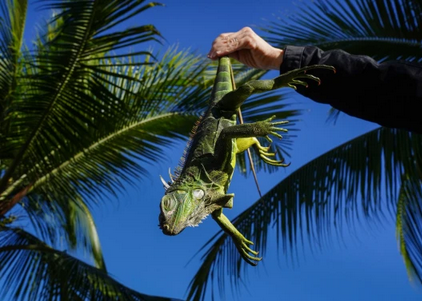[ad_1]
Iguanas have cooled so much in some parts of the US that they are falling from the trees where they stand.
A cold period in Florida, which is known as the state of the sun in the US, is causing these cold-blooded reptiles to embrace the force of their capture in the branches, as their body is stopping metabolism.
Experts say most of them will survive but most of their body can not function in cold weather as temperatures are approaching freezing.
So whenever animals fall from trees, they are reawakened by the warmth of the sun – but they can not do so when the temperature is close to freezing.
Zoologist Stacey Cohen, a reptile expert at the Palm Beach Zoo in Florida, explained the phenomenon to the rrjetPBF television network.
She said: “At this point their body begins to close and the animals lose function while they are on the branches sleeping as it gets very cold, and consequently fall from the trees.”
Although reptiles mostly survive the immobilization period, zoology says the prolongation of cold temperatures is a threat to their survival.
Cohen mentions a cold period in 2010 that wiped out a large number of iguanas in Florida.
“The cold is very threatening to them because they come from South and Central America which are places near the equator and always stay warm.”
Green iguanas do not originate in Florida, and authorities acknowledge that they came to the US accidentally stranded on transport ships.
This invasive species can reach weights of 7.5 kg and 1.5 meters long.
The Miami-Florida Weather Service commented on the phenomenon: “Iguanas are cold-blooded animals. “When the temperature drops below 5 degrees C they become immobile, they can fall from the trees but they are not dead.”
Iguanas are not the only animals being hit by the cold this winter.
Last week thousands of fish were caught by the thermal shock on offshore farms in Greece when heavy snow covered the country.
top channel
[ad_2]
Source link
















